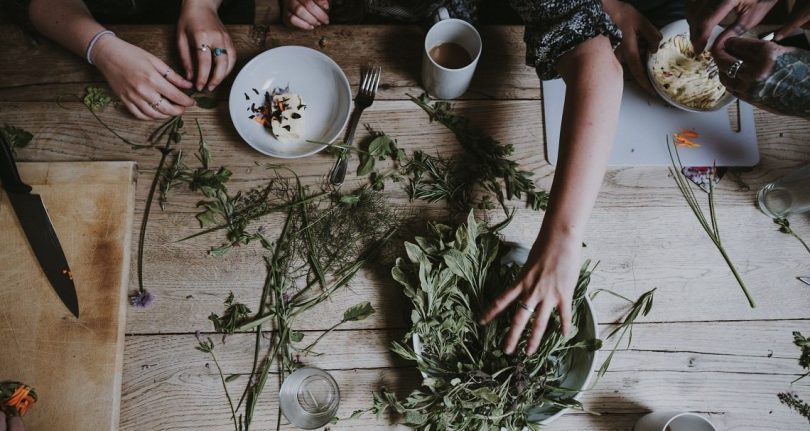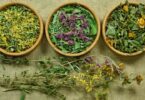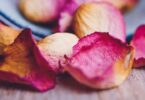Here´s everything you need to know about storing dried herbs.
While it’s common knowledge that the best time to use garden herbs is right after harvest, there are times when you end up with more than you can consume in one season. Dried herbs are the next best thing to fresh herbs so whether you use them to cook with or for medicinal purposes, it’s important that you know how to store them properly.
Here’s a complete guide on how to store dried herbs so that you can retain their flavor and enjoy them all year round.
How to Store Dried Herbs
First, let’s get down to the basics. To store dried herbs, there are the 3 things you need to consider:
1. Container
The key to storing dried herbs is to make sure that they don’t get exposed to air for too long. Oxygen has a nasty way of making dried herbs go stale really fast so it’s crucial that you use the right containers.
Mason jars make amazing storage containers because they have screw cap lids that ensure a tight seal. If you don’t have any mason jars around and are looking for a cheaper alternative, you can also use tins without the glass tops. But remember to check first if the herb you’re storing is compatible with metal as some herbs may not respond well to tin.
2. Exposure to sunlight
Aside from air, another thing that you need to consider is sunlight exposure. Sunlight causes herbs to decay and change color so it’s best that you avoid storing them in areas where they will be exposed to direct sunlight.
Ideally, dried herbs should be stored in dark places like cabinets and drawers. If you prefer to keep them out where you can easily find them, one way you can block sunlight exposure is by using dark colored jars to store your dried herbs.
3. Temperature and humidity
Lastly, check your room temperature and humid conditions. Dried herbs last longer when kept in a room with stable temperature and low humidity. On the other hand, extreme temperature changes can cause molds to grow on your dried herbs so avoid storing them in the attic or basement.
Tips on storing dried herbs
1. Make sure herbs are completely dry
The first step you need to do is make sure your dried herbs are completely dry. Any water content, even a thin layer of moist, can compromise the quality of your dried herbs. To make sure that the herbs are absolutely dry, try rubbing them between your fingers.
If they feel crisp and crumble easily, then it’s okay to store them. If they feel tender, place them in a dehydrator for a short time to dry them.
2. Find a good place to store dried herbs
Once your dried herbs are in their respective airtight containers, it’s time to find a dark cool dry place to store them in. if you want your dried herbs to be kept in top shape longer, avoid leaving their containers near your cooking area where they can be exposed to heat and sunlight.
3. Label dried herb containers according to purchase or harvest date
It can’t be emphasized enough: It’s important to label the containers you keep your dried herbs in. It’s the only way that you’ll be able to maximize your supply. Aside from the name of the herb, labels must also include purchase or harvest date and expiry date. Even properly stored dried herbs lose their potency over time so it’s good to have a point of reference when it’s time to replace them.
How to maximize your dried herbs’ shelf life
While most people think that only fresh herbs decay, dried herbs can also lose their quality when stored the wrong way. Dried herbs in general have varying shelf lives. It usually depends on two factors: the part of the plant they’re from and their form.
Some dried herbs retain their potency and flavor better than others so make sure to do your research. For example, powdered dried herbs have more surface area that can be exposed to air so they tend to lose their aroma and flavor faster than dried whole herbs.
The average shelf life of whole herbs depends on the part of the plant it’s from.
- Herbs from roots can last up to 3 years before they start to disintegrate.
- Herbs from seeds and barks last anywhere from 2 to 3 years.
- Herbs from leaves and flowers last for up to 2 years if stored properly.
- And since ground herbs tend to decay faster, herbs from roots last only up to 2 years, while herbs from leaves, seeds, and bark last for only a year max.
Basic guidelines for storing dried herbs
1. Air and light are the enemies
Watch out for air or sunlight contact. Find ways to minimize your dried herbs’ exposure to the elements if you want them to last longer.
2. Store dried herbs in small amounts
Herbs start to lose their flavor once you grind them. If you’re going to store ground herbs, make sure to do so in small amounts to avoid waste.
3. Avoid cutting herbs
Herb quality also starts to disintegrate as soon as they’re cut so if you’re aiming for long-term storage, try to keep them intact for as long as you can. If whole herbs are too big for your airtight glass container, you next best option is to keep them in a vacuum-sealed bag.
4. Dehydrate herbs before storage
If you’re planning to dry and store your excess garden herbs, make sure to dehydrate them before anything else. Most people think it’s fine to hang herbs upside down but what they don’t know is that this is the fastest way for herbs to lose their color, aroma, and flavor.
READ ALSO: 6 Food Drying Methods – Pros, Cons and Best Tips
5. Avoid keeping dried herbs near a heat source
Avoid keeping your dried herbs near a heat source like your steam cooker or stove. Only take out herbs from their dark cool storage place when you’re about to use them.
Dried herbs, when stored properly, are known to keep well so the least you can do is protect them from decay, damage, and infestation. Make sure to follow this guide to ensure that you get the best results.





